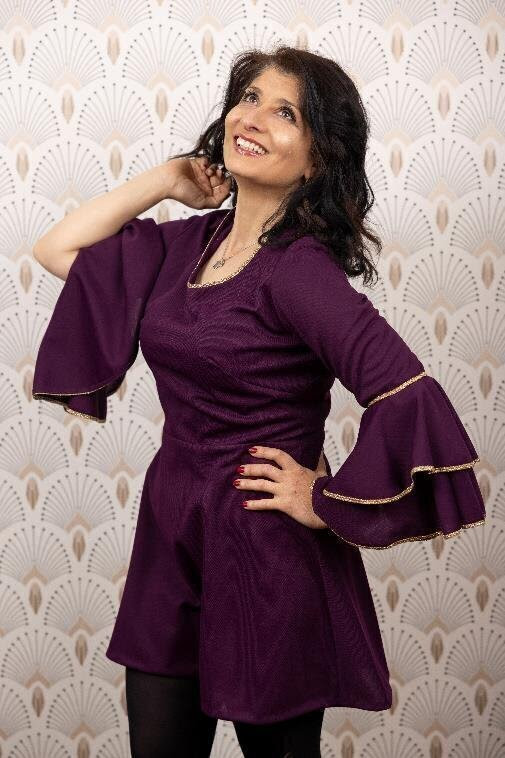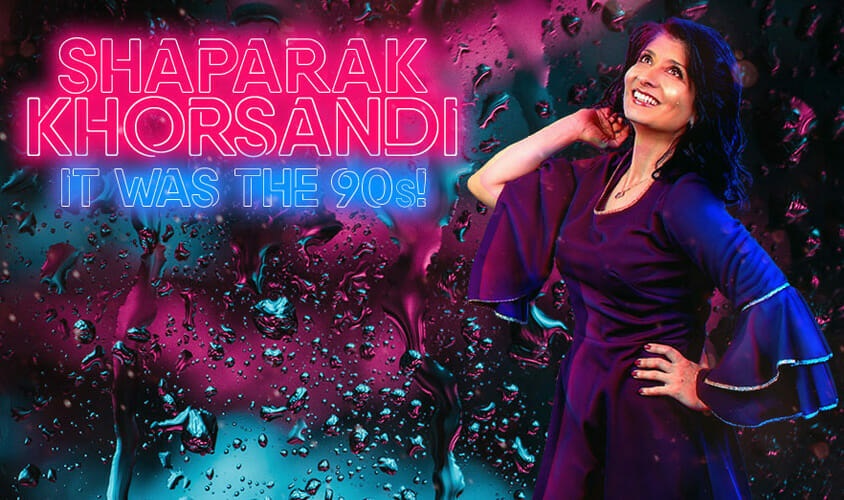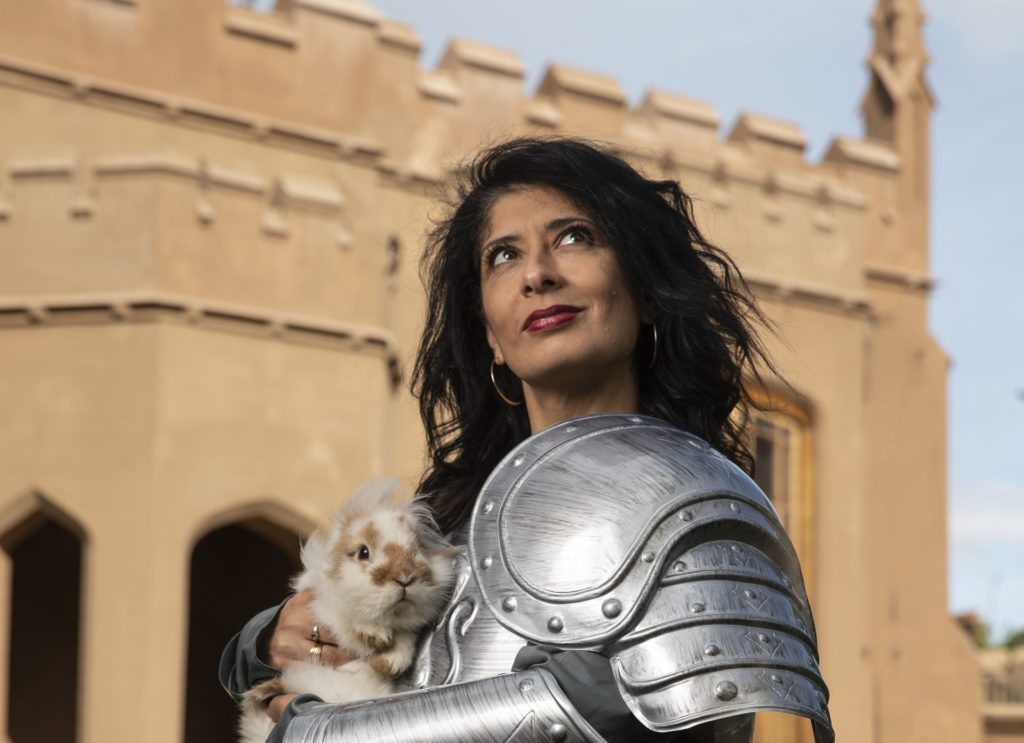
SHAPARAK Khorsandi, the Iranian-born British stand-up comedian and author formerly known as Shappi, tackles 1990s’ culture in her new show at Selby Town Hall on January 22.
Back then, she flew around London with hope in her heart, a tenner in her pocket and spare knickers in her handbag. “But how does the decade of binge drinking and walks of shame look now without snakebite and black-tinted specs?” asks Shaparak, 48.
“It Was The 90s! is a show about how we ’90s kids are looking to young people to learn how to take care of ourselves, because if you survived the car crash of being a ’90s kid, then surely Things Can Only Get Better.”
The new show emerged from Shaparak realising that her son’s generation regards the 1990s the way her generation regards the 1960s. “It’s a show that massively talks about the Nineties’ ‘ladette’ culture, which was a culture of women supposedly taking their power back by drinking the boys under the table and all that mayhem of emulating the worst of laddish behaviour,” she says.
“I talk about how and why I threw myself into that wholeheartedly in the ’90s, which is also when I started stand-up comedy. That was part of my need for freedom and the comedy circuit seemed like the most punk place to be. It’s very different to the way it is now.”
Hedonism and escapism form Shaparak’s abiding memories of the Nineties. “In the show I talk about all the harm I need to undo. You didn’t just go out for a drink hoping you’d meet someone you fancied, you drank and drank until you fancied someone,” she says.
“It’s also about how, back then, I went to university with people who’d say ‘I’ve only got £200 to last me until Monday’ when I was a cleaner on Saturdays and Sundays to pay for my beer. “
You really saw the class difference, she recalls. “I had one friend who said of her parents, ‘They want me to have a work ethic, so they’ve said to me, if I get a job, they’ll match my hourly rate pound for pound’.
“Before I went to university in the ’90s, I’d never come across private-school kids before. That’s why Jarvis Cocker became my absolute hero with Common People, because that song for me expressed how I was feeling in this brand-new adult world I was navigating. Then I come to 2022 and how I’ve changed from the 23-year-old me.”
Contemplating how she has altered since then, Shaparak notes: “I’m not quite the Socialist she was. I’m looking back at how my politics have changed and how my outlook has also changed. And you have to shelve the ‘ladette’ behaviour if you want to live for longer.

“I look at Emma Watson now. She’s the sort of leading light of young feminism and when I look at her, I go, ‘Oh my God, you look so clean’. She looks like she goes to bed at a sensible time, whereas in the ’90s I don’t remember ever deliberately going to bed.
“It Was The 90s! offers me the chance to look at how young people look after themselves now compared to then.”
Looking for examples of the difference between then and now, Shaparak says: “Self-care in the ’90s was about having a Berocca. If I’d said to my friends in the ’90s, after a one-night stand where the bloke thought my name was Jackie, that I was going to take some time out, do some breathing exercises and meditation, become vegetarian and work on my boundaries, they would have thought I’d joined a cult. Self-care was what people in cults did.”
Alongside Pulp’s Common People, what would made Shaparak’s ultimate 1990s’ playlist? “Alanis Morissette’s You Oughta Know, because it was the first time I’d really heard an angry female voice in a pop song. Also, Chumbawamba’s Tubthumping, The Prodigy and all of the songs that talked about chaos and mayhem. Then Eminem. Weirdly, I was really connected to Eminem.”
Shaparak is heading out on her first tour since 2017, her first dates too since being diagnosed with ADHD (Attention Deficit Hyperactivity Disorder) in lockdown. “I got proper help with it,” she says.
“What I’m finding is that it’s changed the way I do comedy. People ask, ‘Are you worried it’s going to affect how you are on stage?’ and I’m like, ‘No, it’s made me better. It’s made me a better writer and a better performer, having pills that help me to focus’.
“There was always a lot of anxiety around tours and there was always a lot of ‘I’ll just do it in the moment and hopefully it’ll work’. This is the first time I’ll be doing a show whilst looking after my ADHD and creatively it’s been a game-changer.”
A game-changer in all sorts of ways, she expands: “I’d say this is the first time doing a tour where I’m absolutely sure that I’m going to have a lot of fun and no anxiety. It’s a real privilege to have a clear head.
“I feel my brain works for comedy much better than before. I feel like I’m starting my career from scratch whilst also having 20 years’ experience behind me, if that makes sense.”
Shaparak kept busy in lockdown writing her book Emma when she “should have been educating my children, so their careers and dreams are going to have to happen a year later than planned”.

“I’m a single mum with two kids, so there wasn’t a moment of boredom in lockdown, and I’ve got two dogs, so there was a lot of mopping of floors. I didn’t have the sort of lockdown where people were looking for boxsets to binge on. I wish I’d had time to watch telly but I was writing and putting this show together.”
Lockdown also made Shaparak very nostalgic about her younger days. “It made me revisit my youth, which was something I hadn’t done before, and the reason it made me do that was because of the loss of freedom,” she says.
“It took me right back to the age where I felt the most free, which was in the ’90s, where every night was spent rushing out with nothing but a tenner in my pocket, spare knickers in my handbag and hope in my heart.
“It made me think about those years a lot and what a blur they were, yet actually stepping back into that era during lockdown, it was interesting just how much I inhabited twentysomething me again.”
By comparison with those Shappi Nineties, her idea of a great night out now comprises a “nice, chilled festival somewhere, where someone hands me something nice to eat and we watch a band that we love”. “I still like a party but not to the detriment of my physical and mental health,” she says.
Should you be wondering why she now goes by her full name of Shaparak – although her Twitter account is still @ShappiKhorsandi – here is the explanation. “The first thing I did in the ’90s was start A-level college and I went, ‘Right, no-one’s allowed to call me Shaparak anymore, I’m Shappi’,” she says.
“If you had a foreign name, you were expected to make it as easy as possible for everyone by either shortening or changing it. That doesn’t exist for young people anymore. I changed it back in spring this year. I was very invested in the football and Raheem Sterling comes from Brent, near where I grew up, and Bukayo Saka went to school in Greenford.
“I went to a school down the road in Hanwell and we used to play sports against his school. These are the sort of boys I’d have gone to school with, and I was impressed that they spoke so proudly of the backgrounds they came from, how they were from poor and immigrant families and how they had elevated themselves without changing their names. It wasn’t Ray Sterling and Bob Saka. I thought, ‘Wow, back then life would have been so different for them’.”
This led her to ask herself, “Why am I Shappi? I’m almost 50 years old, for God’s sake. Why have I got the name of a puppy?”.
“I watched Dirty Dancing again, and you know where she says at the beginning ‘That was the summer of 1963, when everybody called me ‘Baby’ and it didn’t occur to me to mind’? I just thought that it really should occur to me to mind that on all the posters and TV shows and books and everything I’m billed as Shappi, but that’s not my name,” she says.
“The only reason I’d got rid of it was because I grew up in a time when you were made to feel a bit ashamed of being foreign and making life difficult for everyone because you had a three-syllable name that was unfamiliar. I’ve changed it back because I don’t think we live in that world anymore.”
Shaparak Khorsandi: It Was The 90s!, Selby Town Hall, January 22, 8pm. SOLD OUT. Also: Square Chapel, Halifax, February 4, 8pm; The Civic, Barnsley, May 20, 7.30pm. Box office: Halifax, 0343 208 6016 or squarechapel.co.uk; Barnsley, 01226 327000 or barnsleycivic.co.uk.
